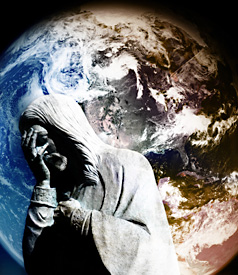
by: Paul Rogat Loeb
When we become frustrated in working for change, we might remember how hope can come from unexpected places and historically resistant constituencies. Rich Cizik's efforts to engage his fellow evangelicals on global warming exemplifies this.
 As vice president for governmental affairs of the National Association of Evangelicals (NAE), Rich Cizik represented 4,500 congregations serving 30 million members. Considering himself a "Reagan conservative" and a strong initial supporter of George W. Bush, Cizik had been with the organization since 1980, serving as its key advocate before Congress, the office of the president, and the Supreme Court on such issues as opposition to abortion and gay marriage. During the Clinton era, he had begun to expand the organization's agenda by tackling such issues as human trafficking and global poverty, working with groups across the political aisle. Later he'd persuaded the organization to take a stand against torture.
As vice president for governmental affairs of the National Association of Evangelicals (NAE), Rich Cizik represented 4,500 congregations serving 30 million members. Considering himself a "Reagan conservative" and a strong initial supporter of George W. Bush, Cizik had been with the organization since 1980, serving as its key advocate before Congress, the office of the president, and the Supreme Court on such issues as opposition to abortion and gay marriage. During the Clinton era, he had begun to expand the organization's agenda by tackling such issues as human trafficking and global poverty, working with groups across the political aisle. Later he'd persuaded the organization to take a stand against torture.
But he thought little about climate change until 2002, when he attended a conference on the subject and heard a leading British climate scientist, Sir James Houghton, who was also a prominent evangelical. "You could only call the process a conversion," Cizik said. "I reluctantly went to the conference, saying 'I'll go, but don't expect me to be signing on to any statements.'
"Then, for three days in Oxford, England, Houghton walked us through the science and our biblical responsibility. He talked about droughts, shrinking ice caps, increasing hurricane intensity, temperatures tracked for millennia through ice-core data. He made clear that you could believe in the science and remain a faithful biblical Christian. All I can say is that my heart was changed. For years I'd thought, 'Well, one side says this, the other side says that. There's no reason to get involved.' But the science has become too compelling. I could no longer sit on the sidelines. I didn't want to be like the evangelicals who avoided getting involved during the civil rights movement and in the process discredited the gospel and themselves."
One day during the conference, Houghton took Cizik on a walk in the gardens of Blenheim Palace, Winston Churchill's ancestral home. It was a lovely day, sunny and bright. Houghton said, "Richard, if God has convinced you of the reality of the science and the Scriptures on the subject then you must speak out."
"Let me think about it," Cizik responded. He knew he'd meet resistance from his colleagues and board. But Houghton convinced him that the world couldn't solve the issue without serious American participation, and that the Republican Party was the major political force blocking action in the United States (in contrast to Europe, where conservative parties had helped take the lead on the issue). "As evangelicals, we're 40 percent of the Republican base, so if we could convince the evangelical community to speak out, it could make the key difference," Cizik said. American evangelicals, Houghton told him, might literally hold the fate of the planet in their hands.
After leaving the conference, Cizik began reading and learning. Flying over the Sahara, he got a sense of the "tens of thousands of acres that are lost to climate-related desertification each year," which in turn leads to major refugee migrations and potential wars over water. He coordinated a retreat with key evangelical leaders, like Rick Warren, and major scientists, like Houghton and Harvard's E.O. Wilson. Then he took a similar group to Alaska to witness the melting glaciers and permafrost, the disruption of native communities, the spruce trees dying because the bark beetles now survived the warmer winters.
They visited Shishmaref, a native village that is being forced to relocate because the permafrost has crumbled beneath it and the sea ice that once served as a storm buffer is gone. "Our first night there, we saw a lunar eclipse, shooting stars, and the Northern Lights." It reminded him of the phrase in the psalm, "Creation pours forth its praise to its creator. . . . The heavens give witness to God's glory."
His Alaska group, said Cizik, "included those who believe life on Earth was created by God, and those who believe it evolved over three and a half billion years. What became obvious to both groups is that this Earth is sacred and that we ought to protect it. God isn't going to ask you how he created the Earth. He already knows. He's going to ask, 'What did you do with what I created?' If we're leaving a footprint that destroys the Earth, we've failed to be good stewards."








No comments:
Post a Comment